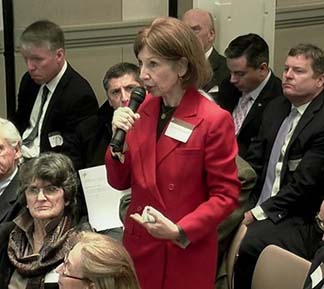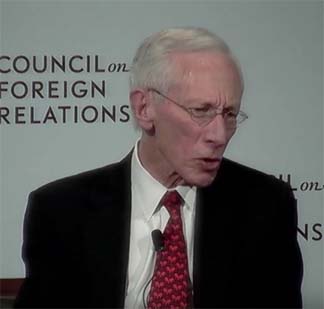Feb 2, 2016
By Lucy Komisar
At the Council on Foreign Relations yesterday, I pointed out to Stanley Fischer, Vice Chairman, Board of Governors of the Federal Reserve, that the current low unemployment rate he cited in his talk doesn‘t mean what it did when workers had good manufacturing jobs – when now the employed are often working for the minimum wage and need government aid. Shouldn’t the Fed put out those numbers? He avoided answering the question.
Q: Lucy Komisar. I‘m a journalist.

A 5-percent unemployment rate, say, 30, 40, 50 years ago, when people were getting factory job wages”$30 an hour”that same number now, when such people are serving hamburgers for the minimum wage, if you just come out with those unemployment rates, that‘s not really telling you about the health of the economy and the welfare of the population.
Should you add another number”another bit of data to the numbers that you put out that talk about the numbers or percentages of workers who are getting enough money to take care of their families and, for example, don‘t have to depend on food stamps?
Tom KEENE, Editor-at-Large, Bloomberg News, moderator: Well, but this goes to the heart of the”of John Edwards, of two Americas. Has the Fed mechanism changed, given an anger that‘s out there, as we see in our political debate? Has the process that you‘re working with changed?
Q: But just tell us your numbers.
KEENE: Well, that doesn‘t have a number.

Fischer differed.
FISCHER: The numbers are all there, ma‘am.
KEENE: But to the point, the Pew Research recently has come out with a wonderful study of the middle class and the changing of the middle class. You‘ve seen this across all of your academic career. Do our central bank institutions need a new calculus to address the polarity of our labor force?
FISCHER: Well, I don‘t see a new calculus to address the polarity of the labor force. I can see research, which is taking place and which has led to many discussions, of the relationship between the things we do and the distribution of income”namely, are low interest rates good for the poor or bad for the poor? The people who look at them say, well, they must be bad for the poor because it‘s the rich who save, who invest, and so forth.
That actually doesn‘t make sense. What is good for the poor is employment. And that is a goal of ours, and that is a goal that we succeeded in dealing with very strongly, or the American economy succeeded in dealing with it very strongly. And we have close to full employment at the moment. It may be a bit lower than the current rate, may be about the current rate. We‘re in that vicinity. And that is the achievement of the monetary policy that has been followed.
No calculus, no way to figure out what Americans are earning? I didn’t get a chance to ask why workers think there’s an employment crisis while he apparently thinks employment is just fine. Maybe the results of the Democratic caucuses in Iowa that night raised the question in Fischer’s mind.
Video. Lucy’s question at 54:30 minutes in.
You didn’t read this in the MSM. And you won’t. Please donate to make such self-financed reporting possible!


Great question and a very revealing intervention with — dare I say it? — the *real* monetary viceroy of the Federal Reserve System.
Fisher’s worries about his “huge” portfolio clearly trump any concern or even awareness of 21st Century employment environment caused by trade and investment policies pushed by his board members. And by the CFR, I might add.
Stanley Fisher actually said that he is far too occupied with his “huge portfolio” than he is with generating jobs and needed national infrastructure that could create real jobs. Stanley’s”portfolio” is in fact $5 Trillion of worthless, often criminal, derivates-based “securities” monetized at *face value* to save the member banks themselves. Under Bernanke and now Fisher-Yellen, they bought this criminal garbage *from themselves* at face value with public credit in QE1/2/3 at the rate of $1 Trillion per year, and carry it on the public balance sheet.
What could possibly be more important for Stanley?
Thank you Lucy for having the moxie and the access to pose this question and call him out on his totally inadequate, impudent response.